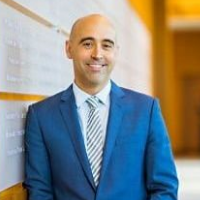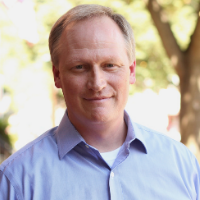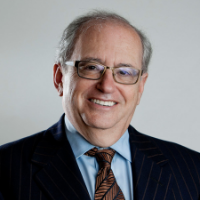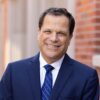Today’s Politics Have More Stress, Electoral College Conflict than Founding Years
By Matthew Kredell
In contemporary politics, the possibility of the electoral college vote not matching the popular vote causes social and political tensions– but this wasn’t a concern at the time of George Washington and the Founding Fathers of the United States.
Eight days prior to the 2020 national elections, the George Washington Leadership Lecture Series focused on the differences between electing a U.S. President now and in the early years of the country. The series launched six years ago as a partnership between the USC Price School of Public Policy and the Fred W. Smith Library for the Study of George Washington.
This year’s lecture focused on two conversations: the emergence of the electoral college and the role it plays in U.S. elections, and our current election and the growing polarization in the landscape of American politics. USC Price Interim Dean Dana Goldman made welcoming remarks for the virtual event.
Denver Brunsman, an associate professor at George Washington University, provided the background on the electoral college in a conversation with Kevin Butterfield, executive director of the Library.
Brunsman explained that the original vision of James Madison at the Constitutional Convention was that Congress would elect the President. But a lot of delegates, especially from small states, didn’t like that idea. They wanted states or state legislatures to choose the President.
James Wilson of Pennsylvania originally proposed a national popular vote. When that idea didn’t get support, he offered that the people could choose electors to elect the President.
“It was a system that really no one loved, but eventually it ended up becoming the choice because the other two choices – either Congress or the states – no one would agree with that either,” Brunsman said. “… Madison in his notes from the Convention mentions the hurrying influence that led to the electoral college. So, the 21st century translation is they ran out of time.”
Brunsman explained that our fears about the electoral college are quite different from the founders.

“Today we think that the electoral college kind of fails if the popular vote doesn’t match the electoral vote,” Brunsman said. “They’re not even really thinking about the popular vote.”
Electors going rogue and not following the will of the state has long been a concern, but that was actually the expectation of the founders. The original model of electors expressing their will and thinking independently disappeared quite quickly, with the current system of popular vote by state deciding who wins the electorate taking over by 1800.
In 1804, Congress passed the 12th Amendment to specify that electors have to distinguish between President and Vice President. Previously, the second place vote getter became Vice President. It proved problematic for potential rivals to work together.
The first election where the popular vote didn’t match up with the electoral vote was in 1824, when Congress chose John Quincy Adams as President over Andrew Jackson.
A Different Electoral College System than the 1800s
Norman Ornstein illustrated how different things are today. Between 1824 and 1996, only once did the clear winner of the popular vote lose the election. Since then it happens 40% of the time. In the last 30 years, Republicans elected President have only won the popular vote once.
Ornstein, resident scholar for American Enterprise Institute and a contributing editor and writer for The Atlantic, spoke on the current election and political trends in a conversation with USC Price Prof. David Sloane.
“That’s part and parcel I think of the tension we face right now,” Ornstein said. “The country has moved more and more toward believing that, while voters chose representatives who then choose the polices we have and at least to some considerable degree chose the President, voters should play a significant role. It’s the will of the electorate that ought to matter.”

Ornstein explained that when the framers set up the system, the ratio of population of the smallest state to the largest was roughly 12 to 1. Now it’s 70 to 1. By 2040, 70% of Americans will live in 15 states and 50% will live in eight states.
“That means we’re increasingly moving to a point where it will perhaps become more frequent than not that the winner of the popular vote loses the presidency,” Ornstein said. “At some point, that’s going to affect the legitimacy of the system.”
But Ornstein doesn’t think there will be a change to the electoral college system anytime soon.
Two Very Different 2020 Presidential Campaigns
Ornstein spoke about the campaigns of the presidential candidates. He saw Trump running a standard reelection campaign but his focus on economic success got blown up by COVID. Ornstein called the coronavirus a central player in the election. If Trump had followed the advice of experts from the beginning, Ornstein thinks he would probably be coasting to reelection.
“One of the interesting things when you look at Trump’s approval across a range of issues is he’s down particularly on the handling of COVID, but not down particularly when it comes to the handling of the economy,” Ornstein said. “The public believes the economy was doing well before COVID and Trump wasn’t responsible for the advent of the virus and the pandemic, and that much of the economic turmoil therefore was something he did not cause. But the way in which he’s handled it and the turmoil that results from it are hurting him a lot in the campaign.”

He thought the “boring campaign” run by Biden was the right one for the circumstances.
“When you’re running at a time of national crisis with a pandemic and you have a President who’s confrontational and combative … it makes sense to say that you’re going to get back to a point where people don’t have to wake up in the morning and wonder what the President said or what our politics are going to be,” Ornstein said.
He added that he thought Biden effectively talked about the economic concerns of working-class voters while trying to move away from the tribal identities.
Ornstein was correct in his expectation that the voting turnout would be the highest in modern times.
The Future Biden Administration
He spoke about what he expected from Biden’s first term. He sees Biden facing a real challenge in Congress that will make it difficult for him to get big things done such as an infrastructure package, economic recovery/COVID relief package, healthcare and voting system reforms.
“What we do know is that Biden has a very strong group of people ready to move into his administration who are talented and experienced, and that he will rely very heavily on science,” Ornstein said.
He expects Biden will immediately go about conducting foreign policy in a very different way than the previous administration, reaching out more to allies and rebuilding alliances with NATO. And he forecasts executive action on the environment and climate change, with some progress on health reform.
But he warns that it’s not going to be easy governing for the new President.
“Frankly, we have to confront a reality,” Ornstein said. “In the country as divided as it is, with far too many people believing that the people on the other side of the aisle are not just worthy adversaries but the enemy trying to destroy our way of life, in a world with tribal media amplified by social media, where it is so easy to spread rumors, conspiracy theories and false things, and in a world where the system makes it harder to implement things or to change the nature of the system, it is going to be a deep challenge no matter who is governing.”
Related faculty

David Sloane
Professor
Chair, Department of Urban Planning and Spatial Analysis
Dana Goldman
Dean, USC Sol Price School of Public Policy; C. Erwin & Ione L. Piper Chair;
Leonard D. Schaeffer Director's Chair, Schaeffer Center for Health Policy & Economics;
University Professor of Public Policy, Pharmacy, and Economics